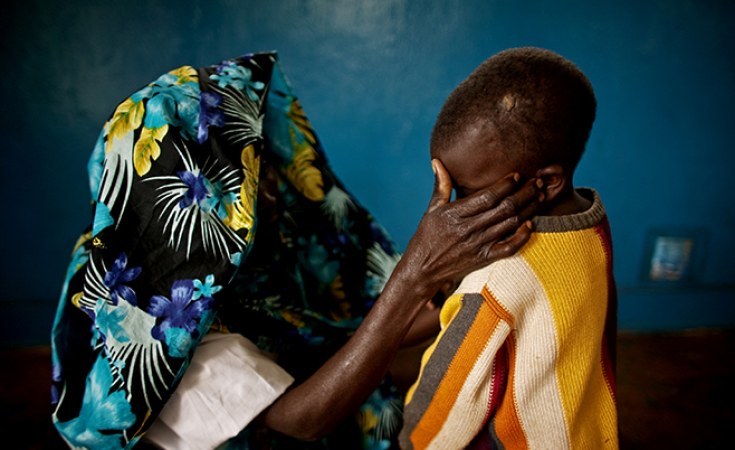UN Women Goodwill Ambassador, award-winning playwright and actor Danai Gurira has delivered today powerful remarks at the UN Security Council during the annual open debate on conflict-related sexual violence. The debate, organized under the Malta Presidency of the Security Council, focused this year on preventing conflict-related sexual violence through demilitarization and gender-responsive arms control.
Ms. Gurira was accompanied by other briefers included Pramila Patten, Special Representative on Sexual Violence in Conflict, who presented the Secretary-General's fifteenth annual report on conflict-related sexual violence; and Niemat Ahmadi, Founder and President of Darfur Women Action Group.
Below are some highlights of Ms Gurira's remarks, the full version can be read here .
Eighty cents. When was the last time you handled 80 cents? Paid for something and that was all it cost? It is not even enough to buy a packet of gum in this day and age. But it can buy you a child to rape at a so-called Maison de Tolerance in a camp for internally displaced people in Eastern DRC [Democratic Republic of Congo].
That is the world that we are still in, where conflict zones are terror zones for women, and children.
What shocks me is how these crimes are being committed all around the world, how vast and widespread the issue has become. The report [Report of the Secretary-General on conflict-related sexual violence (S/2024/292)] covers 25 situations: from Colombia to the Ukraine, to Israel and the Occupied Palestinian Territories, Haiti and, closer to home for me, as a Zimbabwean, DRC, Ethiopia, Central Republic of Africa, and Sudan. This issue has now become prevalent for more countries, not fewer.
We must acknowledge women and survivors all over the world. Nothing is more dangerous than crimes that are not acknowledged, crimes that are unseen and allowed to persist.
I am here today to amplify the voices of those who are never seen and heard, to acknowledge their suffering, and to make sure they are not forgotten. And to hold those that are allowing this to continue, responsible.
There are more services for survivors than before, more people working on this than before, but we are merely swimming against the tide, getting nowhere. And that tide is emboldened by nine consecutive years of increased military spending, reaching an all-time high of more than 2.4 trillion dollars. The actors committing sexual violence at such high rates in Sudan, the DRC, Ethiopia, or Haiti, to name a few, are armed to the teeth, flagrantly violating arms embargoes. We hear so much about disruptions to the global supply chain, but the weapons keep flowing.
How can your words in this chamber or the UN's small programmes in conflict areas compete with 2.4 trillion dollars of military spending and record weapons sales? When we take all bilateral aid supporting feminist, women-led, and women's rights organizations and movements in conflict-area countries, we do not get to 150 million dollars for the last year for which we have data. Put another way, less than 0.01 per cent of global military spending.
The point is that reversing the upward trajectory of military spending would be a way of reducing the number of victims in need of support in the first place. The point is, working on arms control and ammunition management is also working to prevent conflict-related sexual violence. Arms are part of the root of enabling these crimes—that is undeniable.
But I must put forth: fewer weapons doesn't get at the heart of the psychosis of those who use this kind of violence.
The issue that strikes me, shocks me, and always stood out as the one that requires far more strident steps than it currently has, as mentioned, is that of impunity. We see the documentation across the Secretary General's report, across so many testimonies from brave survivors: about the commander who committed the act, and he was let off, due to his political power, his money, his intimidation; the soldiers who terrorized a home, a school, a community, with no consequence; governments allowing their soldiers free rein to terrorize. This happens more times than we can count. As well as a gun issue, we have a deterrence issue.
Even though the ICC [International Criminal Court] has taken up some cases of sexual violence, it is still largely cost-free to rape in the chaos of conflict. I'd like to speak to the Governments here today who allow this to occur within their borders with impunity. If you refuse to protect your most vulnerable, and allow their bodies to be a spoil of your political conflicts, you should be held accountable. And you should not be in a position of leadership.
We also need change of male-dominated cultures, where men are not holding themselves or each other accountable for committing these kinds of crimes, where leaders and their militaries condone this atrocity on their own citizens.
Until we make it clear there are consequences for rape—real, dire consequences—we will never turn the tide of it.
I want to ask Member States in this room where this atrocity occurs, those Member States whose own State soldiers perpetuate these occurrences: Is this a default mechanism in conflict? Is fighting your wars on the bodies of your most vulnerable a tactic of war? What is being done, truly done, to prevent it, to bring justice, to deter future acts of atrocity? You must answer to this and to the girl in Ethiopia right now who doesn’t know if she will make it through the week without being tied to a tree. Right now, a child in Eastern Congo needs us to keep attacking this issue in multiple ways, including disarmament and impunity. And bringing truth to power. She needs us to be relentless and unstoppable. Or she continues a life of unspeakable suffering. Sold for a night. For just 80 cents.
Thank you.


